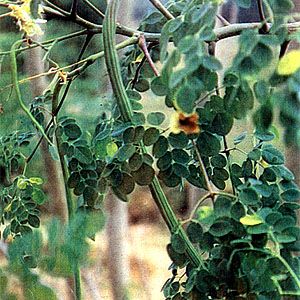
(scientific name: Moringa oleifera Lam.) - is known to different parts of the world under various names including, but not limited to, horseradish tree, drumstick tree, and dool in some regions.
Parts utilized
Flowers, leaves, young pods
Properties
• Root has the taste of horseradish.
• Considered galactagogue, rubefacient, antiscorbutic, diuretic, stimulant, purgative, antibiotic, antifungal.
• Antiinflammatory, antitumor activities on mice studies.
• Antioxidant, anti-aging, anti-ulcer.
• Estrogenic, antiprogestational, hypoglycemic, antihyperthyroidism, hypocholesterolemic, antihyperthyroid, antispasmodic.
• Considered abortifacient and emmenagogue.
• Purported to be beneficial for decreasing blood pressure, relieving headaches and migraines, reducing inflammatory and arthritic pains, anti-ulcer, anti-tumor. Purported to be beneficial for decreasing blood pressure, relieving headaches and migraines, reducing inflammatory and arthritic pains.
Uses
Decoction of leaves used for hiccups, asthma, gout, back pain, rheumatism, wounds and sores.
- Young leaves, usually boiled, used to increase the flow of breast milk.
- Pods for intestinal parasitism.
- Leaves and fruit used for constipation.
- Decoction of boiled roots used to wash sores and ulcers.
- Decoction of the bark used for excitement, restlessness.
- In India pounded roots used as poultice for inflammatory swelling. Flowers used for catarrh, with young leaves or young pods.
- In Nicaragua decoction of roots used for dropsy.
- Roots have been used as abortifacient. In India, bark is used as abortifacient.
- Decoction of root-bark used as fomentation to relieve spasms; also, for calculous affections.
- Gum, mixed with sesamum oil, used for relief of earaches. Same, also reported as abortifacient.
- In Java, gum used for intestinal complaints.
- Roots chewed and applied to snake bites.
- Decoction of roots is considered antiscorbutic; also used in delirious patients.
- Juice of roots is used for otalgia.
- Bark used as rubefacient remedy.
- Decoction of roots is use as gargle for hoarseness and sore throat.
- Leaves used as purgative.
- Chewing of leaves used in gonorrhea to increase urine flow.
- Fresh roots used as stimulant and diuretic.
- Seeds for hypertension, gout, asthma, hiccups, and as a diuretic.
- Rheumatic complaints: Decoction of seeds; or, powdered roasted seeds applied to affected area.
- Juice of the root with milk used for asthma, hiccups, gout, lumbago.
- Poultice of leaves applied for glandular swelling.
- Pounded fresh leaves mixed with coconut oil applied to wounds and cuts.
- The flowers boiled with soy milk thought to have aphrodisiac quality.
- Root is rubefacient and plaster applied externally as counterirritant.
- In West Bengal, India, roots taken by women, esp prostitutes, for permanent contraception (Studies have shown total inactivation or suppression of the reproductive system).
Breastfeeding women
• Malunggay leaves and pods are helpful in increasing breast milk in the breastfeeding months. One tablespoon of leaf powder provide 14% of the protein, 40% of the calcium, 23% of the iron and most of the vitamin A needs of a child aged one to three. Six tablespoons of leaf powder will provide nearly all of the woman's daily iron and calcium needs during pregnancy and breastfeeding.
Toxicities
ª Root bark contains 2 alkaloids, as well as the toxic hypotensive moringinine.
ª Has dose-dependent negative inotropic effect, in isolated frog heart study.
• Niazinin A, niazimicin and niaziminin A and B isolated from the ethanol extract produced hypotensive, bradycardic and negative inotropic effects in experimental animals.
• The bark may cause violent uterine contractions that can be fatal. Chronic high-dose use may cause liver and kidney dysfunctions.
• In frequent or large doses, Interior flesh of the plant can cause toxic nerve paralysis from the alkaloid spirochin.
Availability
Wild-crafted.
Garden and back-yard cultivation.
Commercial production of oil extracted from flowers.
Malunggay capsule (Natalac) - containing 250 mg dried young malunggay leaves, one to two capsules daily.
Miracle tree products in the cybermarkets.
No comments:
Post a Comment